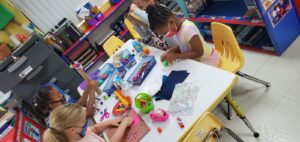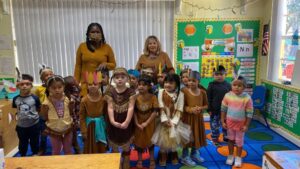Have you ever noticed a young child’s insatiable curiosity? They explore the world with wide eyes and endless energy, constantly asking questions and soaking up information like little sponges. This natural desire to learn is a gift, and nurturing it during the early years is crucial for a child’s future success.
Here at Creative Learning Experience, we believe that high-quality early childhood education is the foundation for building well-rounded, confident individuals who are ready to succeed in school and beyond.
Let’s explore the many benefits of early childhood education, exploring how it can positively impact your child’s cognitive, social, and emotional development.
The Benefits of Early Childhood Education in Children
Early education programs are designed to nurture this natural curiosity and ignite a lifelong love of learning. During these crucial early years, a child’s brain is forming connections at an incredible rate, laying the groundwork for all future development. High-quality early childhood education programs play a vital role in this process, boosting academic skills and social, emotional, and cognitive development.
Cognitive Development
Early childhood education programs provide stimulating environments that encourage exploration and discovery. Through play-based learning activities, children develop important cognitive skills such as:
- Critical thinking: Programs often present children with open-ended questions and challenges, encouraging them to think critically and come up with solutions.
- Memory: Games, songs, and stories all help children develop their memory skills and ability to recall information.
- Concentration: Focused activities and routines help children learn to concentrate and pay attention, which are essential skills for future academic success.
According to the Center on the Developing Child at Harvard University, experiences that promote cognitive development are not just about academics. They are also about helping children learn to regulate their emotions, manage stress, and form healthy relationships.
Language and Literacy Skills
Language is a powerful tool that allows children to communicate, express themselves, and understand the world around them. Early childhood education programs provide a rich environment that fosters the development of strong language and literacy skills. Here’s how:
- Exposure to Vocabulary: Through conversations, songs, stories, and everyday interactions, children are exposed to a wide range of new words, helping them build a strong vocabulary foundation.
- Development of Grammar: Engaging in conversations and listening to stories helps children learn the proper structure and grammar of language.
- Pre-Literacy Skills: Activities like rhyming games, alphabet recognition, and pretend play all lay the groundwork for future reading and writing skills.
- Love of Reading: Being read to regularly fosters a love of books and stories, which is essential for later independent reading.
Experts like Dr. Lise Eliot, a neuroscientist and author, emphasize the importance of early language development. In her article: Tips on the Development of Language and Literacy Milestones, she states, “Parents, caregivers, and teachers should take every opportunity to engage each child in one-on-one dialogue, shared singing and reading stories. Language learning begins at birth (if not before) so make this a habit from day one.”
Mathematical and Problem-solving Skills
Many parents might not immediately associate early childhood education with math skills, but the foundation for mathematical thinking is actually laid during these early years. Here’s how:
- Early Math Concepts: Through play-based activities like sorting toys by color, building with blocks, and playing simple counting games, children develop foundational math concepts like classification, spatial reasoning, and numeracy.
- Problem-solving Skills: Early childhood education programs often present children with challenges that require them to think critically and come up with solutions. This process helps develop important problem-solving skills that will benefit them throughout their lives.
- Logical Thinking: Activities like sequencing games and puzzles encourage children to think logically and follow a set of steps, important skills for future math understanding.
Many studies have shown a strong correlation between problem-solving skills and early math exposure. According to a study published by the National Academy Press, learning mathematics in the early years is especially important for developing general cognitive skills, such as problem-solving and critical thinking skills.
Social and Emotional Growth
Early childhood education is crucial in fostering a child’s social and emotional development. In a nurturing classroom environment, children learn valuable skills such as:
- Social Interaction: Through play and group activities, children learn how to interact with others, take turns, share, and cooperate.
- Building Relationships: Early childhood programs allow children to build friendships and develop strong social bonds with their peers and teachers.
- Emotional Regulation: Children learn to identify and express their emotions in healthy ways, manage frustration, and navigate challenging situations.
The social and emotional benefits of early childhood education are well documented. An article published in the International Journal of Child Care and Education Policy states that children who participated in early learning programs showed better social skills, emotional regulation, and learning approaches than those who did not.
Early education programs help children become well-rounded individuals who are confident, resilient, and ready to build strong relationships throughout their lives by nurturing social and emotional development.
Strengthening Relationships and Empathy
The preschool years are a special time for children to develop strong social bonds and cultivate empathy for others. Early learning programs provide an environment that encourages crucial skills like:
- Secure Attachments: Positive interactions with caring teachers help children develop secure attachments, which are essential for healthy emotional development and future relationships.
- Building Friendships: Through play and group activities, children learn how to start interactions, cooperate with peers, and resolve conflicts peacefully. This lays the foundation for building strong friendships.
- Understanding Emotions: Early childhood programs like ours help children recognize and understand their own emotions and the emotions of others. This fosters empathy and compassion, allowing them to connect with others more deeply.
At Creative Learning Experience, we believe in fostering strong relationships and a sense of belonging for all our students. Contact us to learn more about our enrollment process and schedule a tour of our stimulating and joyful classrooms!
Self-regulation and Conflict Resolution
Young children are constantly learning how to manage their feelings and navigate social situations. Preschool and early education programs provide opportunities for kids to develop crucial self-regulation and conflict resolution like:
Managing Emotions: Children learn to identify and express their emotions in healthy ways through age-appropriate activities and guidance. Teachers and exposure to many experiences help them develop coping mechanisms for dealing with frustration, anger, and disappointment.
Conflict Resolution: Being around other children in educative environments provides opportunities for kids to practice social skills like communication, compromise, and negotiation. This helps them learn how to resolve conflicts peacefully and build positive relationships with peers.
By developing self-regulation skills, children gain a sense of control over their emotions and learn to navigate challenging situations effectively. This sets them up for success not only in school but also in all aspects of their lives.
The Benefits of Early Childhood Education for Parents
While we’ve been focusing on the many advantages early childhood education offers children, the benefits extend far beyond the classroom. High-quality programs can also provide valuable support and resources for parents.
Here at Creative Learning Experience, we understand the challenges of raising young children and are committed to providing a supportive environment that benefits the whole family. Let’s explore how early childhood education programs can empower parents.
Support for Working Parents
Early childhood education programs provide essential childcare for many families, allowing parents to pursue work or educational opportunities. This peace of mind knowing your child is in a safe, stimulating environment, can be invaluable. Here’s how early childhood education programs support working parents:
- Structured Schedule: Preschool programs offer a consistent daily routine, which can be helpful for working parents who need to manage their own schedules.
- Reliable Care: Early childhood education programs provide dependable childcare, allowing parents to focus on their work or studies without worry.
- Early Learning and Development: Knowing your child is being nurtured and learning while you’re away can be a huge weight off your shoulders.
Strengthening the Bonds Between Parents and Children
Early childhood education programs can also play a valuable role in strengthening the bond between parents and children. Here’s how:
- Shared Learning Experiences: Many programs encourage parent involvement through volunteering in the classroom, attending parent-teacher days, or participating in family events. This allows parents to stay informed about their child’s development and learn new strategies for incentivizing learning at home.
- Reduced Stress: Knowing your child is receiving quality care can help reduce parental stress, allowing you to be more present and engaged during your time together.
- Quality Time: When you pick up your child after a day of learning and play, you can focus on quality time together, creating a strong parent-child connection.
Challenges of Early Childhood Education
While the benefits of early childhood education are undeniable, there are also challenges that need to be addressed. Here at Creative Learning Experience, we are committed to providing high-quality education that is accessible to all families. However, we recognize the obstacles some families face in finding the right program for their children.
Access and Affordability Challenges
- Availability: In many communities, there simply aren’t enough high-quality early childhood education programs to meet the demand. This can make it difficult for parents to find a spot for their child.
- Cost: Early childhood education programs can be expensive, creating a financial burden for many families.
According to a report by the Center for American Progress, the high cost of child care is a major barrier to access for many families.
These access and affordability challenges can prevent children from accessing the many benefits of early childhood education.
Quality Standards and Curriculum Challenges
Varying Standards: Early childhood education programs may operate under different quality standards or licensing regulations. This can make it difficult for parents to compare programs and ensure they are choosing the best option.
Curriculum Consistency: Different early childhood education programs may use different curricula and teaching philosophies. While diversity is encouraged, a lack of consistency can make it challenging for children to transition between programs.
How to Enroll Your Child in Our Preschools in Lake Worth
At Creative Learning Experience, we’re passionate about guiding young minds and providing a foundation for a lifetime of learning. We offer high-quality early childhood education programs for children in a warm and welcoming environment.
Our play-based curriculum is designed to light up curiosity, encourage exploration, and foster development in all areas, including cognitive, social-emotional, language, and physical skills. Our dedicated teachers are passionate about early childhood education and hold qualifications in the field. They provide individualized attention and support to help each child thrive.
Our classrooms are designed to be stimulating and safe, with age-appropriate equipment and materials. Your child’s well-being is our top priority. We believe that early learning is essential for your child’s future, and we offer various programs to support children, like:
- Voluntary Pre-Kindergarten (VPK): We are proud to offer a free VPK program. This program provides a wonderful opportunity for your child to experience the benefits of a high-quality preschool environment before entering kindergarten.
- Summer Fun: During the summer months, we offer exciting and educational summer camp activities for our students to keep your child engaged and having fun while learning. These programs are a great way to bridge the gap between school years and give our children great experiences they will remember forever.
Give your child the gift of a bright future! Contact Creative Learning Experience to learn more about our enrollment process and schedule a tour of our preschool in Lake Worth. We can’t wait to welcome your child to our warm and joyful learning community!




